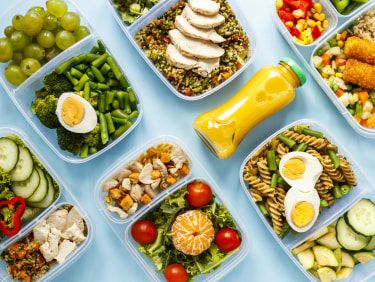A Doctor's Guide to the Best Diets for
Women Over 40 in Mullica Hill

Does it feel like the diet and exercise habits that once worked wonders have suddenly stopped being effective? If you're a woman over 40, you're not alone. It's a common story we hear from women across South Jersey—from Gloucester and Camden Counties to Salem and Atlantic Counties: despite eating right and staying active, the number on the scale refuses to budge, especially around the midsection. If this sounds familiar, please know it’s not in your head, and it’s not a lack of willpower. Your body is simply playing by a new set of rules.
The truth is, the best diet for a woman over 40 isn’t about deprivation; it's about adaptation. It’s about understanding what your body needs now and fueling it with precision.
This guide provides a doctor's perspective on effective, sustainable, and science-backed dietary strategies for women in their 40s, 50s, and beyond. We'll explore why your body is changing, what diets genuinely work, and how to get personalized, local support right here in Mullica Hill.
Why Do Traditional Diets Often Fail After 40?
That feeling of being "unable to lose weight even with diet and exercise" is a common and valid frustration. It’s not a failure of your willpower; it’s a sign that your body's internal landscape is changing. The old "eat less, move more" mantra just isn't enough anymore. Here’s why.
Your Changing Metabolism and Hormones
The years from your 40s onward, covering perimenopause and menopause, can feel like a hormonal rollercoaster. The main driver is declining estrogen, which sets off a cascade of effects that directly impact your weight.
First, falling estrogen slows your metabolic rate, the speed at which you burn calories while at rest. You naturally burn fewer calories just going about your day. This means the same food portions you’ve always eaten can now lead to weight gain. This is compounded by an age-related loss of muscle mass, a condition called sarcopenia. Since muscle is metabolically active, losing it further slows your calorie-burning engine.
At the same time, your body’s stress hormone, cortisol, tends to rise. Chronic stress, poor sleep, and even the stress of hormonal changes can keep cortisol elevated. This is a problem because high cortisol is directly linked to storing visceral fat: the deep, dangerous fat that settles around your abdomen. This "menopause belly" isn't just a cosmetic concern; it increases your risk for heart disease and other metabolic issues.
The Problem With Extreme Calorie Restriction
When the scale creeps up, your first instinct might be to slash your calorie intake. Unfortunately, this is one of the biggest mistakes you can make. When your body senses a major calorie deficit, it goes into survival mode.
It responds by slowing your metabolism even more to conserve energy, making weight loss nearly impossible. This process can also spike cortisol levels, paradoxically encouraging more belly fat storage. You end up feeling tired, hungry, and frustrated, with little to show for your efforts. A successful diet for women over 40 isn't about eating less; it's about eating smarter.
How Can I Speed Up My Metabolism After 40?

While you can't stop the natural metabolic slowdown entirely, you can take powerful steps to counteract it. The most effective strategies involve building and maintaining muscle, which acts as your body's calorie-burning furnace.
Prioritize Protein: As we'll discuss, a high-protein diet is non-negotiable. It helps build and repair muscle tissue and also requires more energy to digest than fats or carbs.
Embrace Strength Training: This is the single most effective way to build lean muscle. You don't need to become a bodybuilder; just two to three sessions of resistance training per week can make a significant difference.
Stay Hydrated: Your metabolism needs water to function efficiently. Dehydration can cause it to slow down.
Don't Skip Meals: Extreme calorie cuts or skipping meals can signal your body to conserve energy, slowing your metabolism further.
Learn more about it in our guide about sustainable weight loss for women after 40.
Which Dietary Strategies Are Most Effective for Women Over 40?
Forget the quick fixes. The most effective dietary strategies for women over 40 are sustainable lifestyle changes that nourish your body, balance your hormones, and support your metabolism. Here are three powerful, doctor-recommended approaches.
The Mediterranean Diet
The Mediterranean diet is consistently ranked as one of the healthiest eating patterns in the world, and it's especially helpful during and after menopause. It's less of a restrictive "diet" and more of a lifestyle focused on whole, nutrient-dense foods.
What It Is: This diet emphasizes vegetables, fruits, whole grains, legumes, nuts, and healthy fats like olive oil. Fish is a primary protein source, while poultry, eggs, and dairy are eaten in moderation. Red meat is limited.
Why It Works:
- It Reduces Inflammation: The diet is rich in antioxidants and omega-3s, which fight the chronic inflammation linked to belly fat and disease.
- It Balances Blood Sugar: High-fiber whole foods prevent the blood sugar spikes that lead to fat storage and insulin resistance.
- It Supports Heart Health: The focus on healthy fats and plants is excellent for cardiovascular health, a key concern for post-menopausal women.
Local Tip: Embracing this lifestyle is easy across South Jersey. Whether you're visiting the Mullica Hill Farmers Market in Gloucester County, the Collingswood Farmers' Market in Camden County, or other fresh markets near you, you can find beautiful ingredients for your health.
Prioritizing Protein
If there's one nutrient to focus on after 40, it's protein. A high-protein diet is essential for fighting the metabolic slowdown that comes with age.
What It Is: This approach means including a quality protein source at every meal. The goal is to get enough to support muscle health and keep you feeling full and satisfied.
Why It Works:
- It Preserves Muscle Mass: Protein provides the building blocks to maintain and even build lean muscle, especially when you pair it with strength training. More muscle means a higher metabolism.
- It Increases Satiety: Protein is more filling than carbs or fats, helping you feel satisfied with smaller portions and reducing cravings for unhealthy snacks.
- It Boosts Calorie Burn: Your body uses more energy to digest protein than other macronutrients, a process known as the thermic effect of food.
- Aim for sources like lean chicken, fish, eggs, Greek yogurt, tofu, beans, and lentils with every meal.
Smart Carbohydrates
Carbs aren't the enemy, but the type you choose matters more than ever. After 40, hormonal changes make your body more sensitive to sugar and refined carbs.
What It Is: This strategy involves choosing complex, high-fiber carbohydrates and limiting simple sugars and refined grains.
Why It Works:
- It Manages Insulin: Complex carbs (like vegetables and whole grains) are digested slowly, providing steady energy without a sharp spike in blood sugar and insulin. This is crucial for preventing insulin resistance [2, 3].
- It Improves Gut Health: Fiber feeds beneficial gut bacteria, which play a huge role in digestion, mood, and inflammation.
- It Provides Sustained Energy: Instead of the quick rush and crash from sugary snacks, smart carbs deliver lasting energy to power your day.
- Swap white bread, pasta, and pastries for quinoa, sweet potatoes, berries, and a wide variety of vegetables.

What's the Best Diet for Reducing Menopause Belly Fat?
That persistent fat around your middle is one of the top complaints from women in this age group. Tackling it requires a holistic approach that goes beyond just what's on your plate.
The Anti-Inflammatory Eating Plan
Chronic inflammation is a key driver of stubborn belly fat. An anti-inflammatory diet, which shares many principles with the Mediterranean diet, focuses on calming this internal fire.
- Eat More: Leafy greens (spinach, kale), fatty fish (salmon), berries, nuts, olive oil, and spices like turmeric.
- Eat Less: Sugar, refined carbs (white bread), processed meats, and trans fats.

What Foods Should a Woman Over 40 Avoid?
While focusing on what to add to your diet is most effective, limiting certain foods can accelerate your progress and reduce inflammation. Consider reducing your intake of:
- Sugary Drinks and Snacks: Sodas, sweetened teas, and candy contribute to blood sugar spikes and offer no nutritional value.
- Refined Carbohydrates: White bread, pastries, and white pasta are quickly converted to sugar, promoting fat storage.
- Processed Foods: Packaged meals and snacks are often high in sodium, unhealthy fats, and preservatives that can drive inflammation.
- Excessive Alcohol: Alcohol can disrupt sleep, raise cortisol levels, and contribute empty calories, all of which hinder weight loss.
Can Intermittent Fasting Help?
Intermittent fasting can improve insulin sensitivity and promote fat loss. A common method is the 16:8 approach (fasting for 16 hours and eating within an 8-hour window). While it helps some people, it's not a magic bullet. For women, long fasts can sometimes raise cortisol, so it’s best to start with shorter fasting windows and see how you feel. It's a tool, not a requirement, and works best with professional guidance.
Supporting Your Diet: The Impact of Sleep and Stress
You can have a perfect diet, but if you're chronically stressed and sleep-deprived, you will struggle to lose belly fat. High cortisol from stress and poor sleep directly signals your body to store fat in your midsection.
Prioritizing 7–8 hours of quality sleep and finding ways to manage stress are non-negotiable. This could be meditation, yoga, or simply taking a relaxing walk through one of our beautiful local spots, whether it's Ella Harris Park in Mullica Hill, Cooper River Park in Camden County, or the serene trails at Parvin State Park in Salem County.
Answering Your Top Questions About Dieting After 40
What is the hormone-balancing diet for over 40?
There isn't a single magic "hormone-balancing diet." Rather, it's an eating pattern that supports your body's natural hormone production and sensitivity. It includes all the principles we've discussed:
Healthy Fats: Foods like avocado, nuts, and olive oil provide the building blocks for hormone production.
High-Quality Protein: Essential for liver function, which helps detoxify and regulate hormones.
High-Fiber Foods: Fiber helps remove excess estrogen from the body and stabilizes blood sugar to manage insulin.
Cruciferous Vegetables: Broccoli, cauliflower, and kale contain compounds that help the body process estrogen effectively.
Essentially, a Mediterranean-style, whole-foods diet is the best hormone-balancing diet.
What is the best breakfast for a woman over 40?
The ideal breakfast is one that's high in protein and fiber to keep you full, stabilize your blood sugar, and fuel your metabolism for the day. Ditch the sugary cereals and pastries. Instead, try one of these:
- A Greek Yogurt Bowl: Top plain Greek yogurt with berries, a sprinkle of nuts, and a spoonful of chia seeds.
- A Veggie Omelet: Two or three eggs whisked with spinach, bell peppers, and mushrooms.
- A Protein Smoothie: Blend unsweetened almond milk, a scoop of protein powder, a handful of spinach, and half a banana.
How do I get a Diet Plan that actually works for me?
If you've tried everything and still feel stuck, it's time to stop guessing and start getting answers.
Beyond Generic Advice: Why Personalization is Key
There is no single "best" diet. The optimal plan for you depends on your unique medical history, hormone levels, genetics, and lifestyle. An approach that works for your friend might not work for you. Lasting success comes from a plan tailored to your individual biology.
The Mullica Hill Medical Advantage: A Medically Supervised Diet
This is where a doctor-led program makes all the difference. Instead of a generic template from a book, a medically supervised weight loss program puts your health first.
At Mullica Hill Medical & Wellness, our approach is built on medical expertise and personalized care. While our practice is rooted in Mullica Hill, we are proud to be a trusted health partner for women throughout Gloucester County and neighboring communities in Camden, Salem, and Atlantic Counties. We don’t just hand you a meal plan; we start with a comprehensive evaluation to understand your body's specific challenges. This helps us see the full picture, including your hormonal health and metabolic rate, to determine the most effective path forward.
For some, this involves a targeted nutrition plan. For others, success comes from combining dietary changes with our other advanced Medical Weight Loss programs. In many cases, especially during perimenopause and menopause, addressing the root cause with treatments like Bioidentical Hormone Replacement Therapy (BHRT) can be the key to finally breaking through a weight loss plateau.
Our doctor-led team ensures your plan is safe, effective, and sustainable. We provide the accountability and support you need to navigate your weight loss journey, helping you make lasting changes that restore your energy and confidence.
Losing weight after 40 can feel like an uphill battle, but it’s a battle you can absolutely win. By shifting your focus from extreme restriction to strategic nourishment, prioritizing protein, embracing healthy fats, choosing smart carbs, and managing inflammation, you can work with your body, not against it.
You don't have to figure this out alone. A personalized, medically-guided approach removes the guesswork and provides a clear, safe path forward.
If you’re ready to stop guessing and start a diet plan that is scientifically designed for you, our team at Mullica Hill Medical is here to guide you. Book an appointment now or call (856) 478-2111 to discover the right approach for your body.